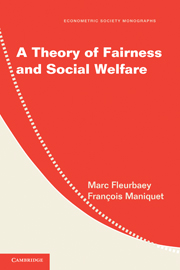10 - Unequal Skills
Published online by Cambridge University Press: 05 January 2013
Summary
INTRODUCTION
In this chapter, we present and study a new model, which is a variant of the private good production model of the previous chapter. Compared with that model, we assume that the production set is linear and that the agents may have different production skills. Consequently, the agents are characterized by two parameters: their preferences and their skills. The natural interpretation of the model, which was introduced in the literature a long time ago, from different viewpoints, by Mirrlees (1971) and Pazner and Schmeidler (1974), is that input is the labor time of the agents and their skill is the wage rate at which they are able to find a job. This is the canonical setting in which labor income taxation issues can be addressed. In the next chapter, we show how some of the social ordering functions we derive here can be used to design optimal income tax schemes.
Productive skills are assumed to be fixed and independent of the labor time. This amounts to assuming that agents use a linear technology. In view of such linearity, the laissez-faire allocations – that is, the allocations at which agents choose their labor time and consume the share of the production that corresponds to their share in the contribution – are natural candidates to qualify as equitable allocations. Indeed, each agent freely chooses his or her preferred bundle and there is no externality among agents.
- Type
- Chapter
- Information
- A Theory of Fairness and Social Welfare , pp. 180 - 202Publisher: Cambridge University PressPrint publication year: 2011



